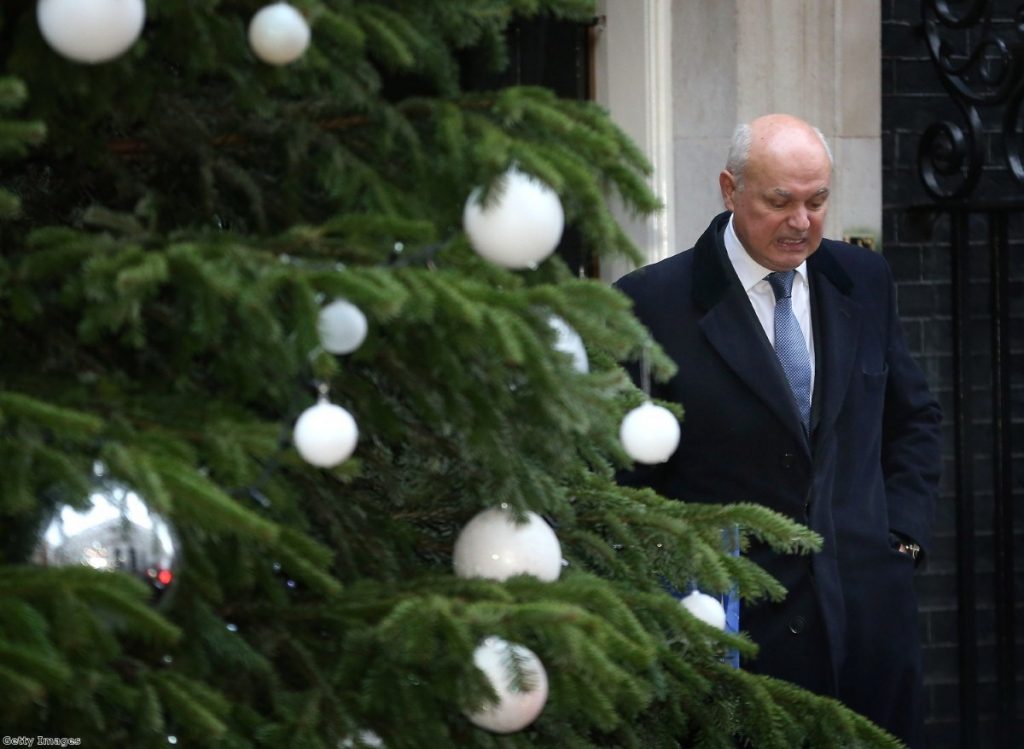IDS: £40m IT write-off was ‘common sense’
Iain Duncan Smith has defended the loss of £40 million of taxpayers' money on a failed IT system as "common sense", during a bad-tempered session in front of a Commons committee.
The work and pensions secretary insisted the money spent on the system, which is intended to manage the implementation of universal credit, was roughly in line with what the private sector would expect to lose on a major IT project.
"Unless you live in a different world to where I do, all IT programmes carry an element of risk," he told MPs.
"In the private sector, when they run IT programmes, the reality is for many of them the write off is 30-40%. So in actual fact this isn’t different from that."


Work and pensions committee member Glenda Jackson said: "Every time you said it was A-OK.
"You told us in September it was on time and on budget. It has now been changed."
Duncan Smith replied: "In essence that was the plan. The different way we're delivering it is, instead of loading those numbers in front, we want to make sure the system works. That's nothing less than common sense."
The former Tory leader said the cost was due to a transfer from 'waterfall' and 'agile' IT to 'tin', which is stored in the cloud.
Duncan Smith, whose political reputation has been hard hit by concerns about the project running out of control, also defended himself against accusations that he manipulated statistics.
He insisted he had only had two letters from the UK Statistics Authority.
He pinned the blame on Conservative Central Office for a comment from Grant Shapps that 900,000 people had given up claims to disability benefits rather than be assessed.
"We would never have done that with those figures, that was something that they [Tory HQ] put together themselves," he said.
"We've had to sit for some time while a lot of bogus nonsense has been talked."
Newly-revealed Office of Budget Responsibility (OBR) figures show only 400,000 benefit claimants will be on the universal credit system by 2015/16 – less than ten per cent of the 4.5 million planned.
Some commentators have suggested Duncan Smith tried to bury the OBR figures on a day when news headlines would be focused on the autumn statement.
Despite forecasts of 2.9 million being on the system by 2017, the OBR warned that even this much-delayed timetable could prove optimistic.
"Given the delays to date, and the scale of migration required in 2016 and 2017, there is clearly a risk that the eventual profile differs significantly from this new assumption", it found.
Duncan Smith rejected suggestions from the public accounts committee (PAC) that he had wasted up to £140 million on mismanagement and the botched IT system, insisting work was going ahead on an 'enhanced' system.
Committee chair Margaret Hodge wrote off that move as a "face-saving fudge" which was intended to delay a further, more substantial write-off of funds until after the general election.
The work and pensions secretary used interviews ahead of the parliamentary appearance to insist he took "complete responsibility" for the debacle, but he is accused of trying to strong-arm Conservatives on the PAC to pin the blame for the universal credit problems onto his department’s senior civil servant, Robert Devereux.
He denies the charge and has suggested that the behaviour of the PAC may be politically motivated.
Embarrassingly, he has also had to answer questions about whether he still enjoys a working relationship with chancellor George Osborne, who is reported to have lost faith in the welfare secretary's intellectual abilities.
"I don't believe it and he has said publicly that he never said it and I'm happy with that," he told the Financial Times.
Duncan Smith was defended by Downing Street this morning, as the prime minister's spokesperson said David Cameron still retained confidence in his struggling work and pensions secretary.
The spokesperson added it would have been the "wrong thing to do" to push ahead with the implementation of the reform and then be faced with having to "retrofit the IT" and suffer "large-scale disruption".
He explained: "This is an approach which has been designed to be gradually rolled out, and that is absolutely the right thing to do."
Rachel Reeves, Labour shadow work and pensions secretary, said: "David Cameron and Iain Duncan Smith repeatedly promised to deliver their flagship policy, universal credit, 'on time and within budget'. That claim, and the credibility they staked on it, now lie in tatters.
"David Cameron and Iain Duncan Smith are presiding over a complete mess and it is taxpayers who are picking up the bill with at least one hundred million pounds of their money written off. Families facing a cost-of-living crisis deserve better than this."
Howard Shiplee, formerly head of construction at the 2012 Olympics, has now taken overall control of the project.









